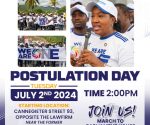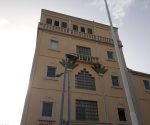PFP Member of Parliament Melissa Gumbs’ Remarks – Constitution Day 2020
![]() Good morning Mr. Chairman, Griffiers, my colleagues in Parliament, and those joining us online and via radio, both here and abroad.
Good morning Mr. Chairman, Griffiers, my colleagues in Parliament, and those joining us online and via radio, both here and abroad.
Mr. Chairman, like my colleagues before me, I do believe that this is a time for critical reflection and discussion. We must reflect on the ENTIRE ten years and not just focus on Hurricane Irma and COVID-19. These are bad things, but they are not the starting points for the social dilemmas facing Country St. Maarten.
The issues we’re experiencing now have existed for years: in fact, since many who voted in the 2020 election were children. The harsh reality of years of unresolved dilemmas have put harsh light on the crises we have experienced since 10-10-10. I cannot think of a better time to, as they say, pull up the handbrake, and take serious account of our situation so that we can all move forward with renewed vigor and focus.
I have experienced this last decade from several viewpoints. On October 9, 2010, I was living in the Netherlands. I, like many young St. Maarteners pursuing their studies or careers abroad, wondered what the future held for our little island.
Were we as ready as we could be, considering the very rush to status apart? Had our leaders prepared themselves for the immense responsibilities they were taking on?
Were we, as a people, prepared to face our new reality, and were we, as a people, prepared to make the occasional sacrifices that might be asked of us for the greater good? Because that is the true meaning of autonomy. Underneath pretty speeches and passionate debates, did we recognize that self-governance includes self-sacrifice to protect the country?
These were the questions in the minds of our students and young professionals, some of whom have since returned home to join the public or private sector.
Much has been said about the process to bring us to country status and how that process was rushed because, well, we needed autonomy and we needed it immediately. I don’t need to explain the saying of ‘haste makes waste;’ it’s what we were told as kids when we rushed through schoolwork only to receive a failing grade, and it usually sticks with us as adults when we consider signing contracts for loans, services or jobs.
Rushing usually results in not reading the fine print and that can be detrimental to the individual. So, imagine the impact rushing can have on an entire population. For us, it meant that we could not properly plan and prepare for the areas we knew we needed to build capacity in.
I know: 100% preparation is a myth. But when I talk about preparation, I mean taking steps towards activating our young professionals, those already studying and those preparing to begin their studies, to come home and work towards building their country.
When we travel as students to the US, especially Florida or New York, we’re encouraged to register with the local Consulate General of the Kingdom of the Netherlands, for emergencies. While preparing to graduate with my Master’s in 2006, I was surprised to receive an email from the newly installed Consul for Netherlands Antilles Affairs with a welcoming message announcing that Curacao is becoming a country.
Attached to this email was a four-page PDF outlining various urgently needed disciplines and the number of spaces available within each discipline that Country Curacao would require to kickstart its development as a country.
Everything from urban planning engineers and lawyers to hospitality workers and project managers; everything they believed they needed to prepare themselves to become a country. It’s part of the nation-building process; identify what’s there and what’s not and take active steps to fill the gaps.
Because nation-building is more than just deciding on political officials’ salaries and scrambling to be the first Prime Minister of a new country. It is more than exchanging one bogeyman for another because we still struggle, collectively, to recognize and admit our shortcomings.
It is much more than having knee-jerk reactions in crises, whether professional or personal.
Reflecting on ten years as Country St. Maarten is not just looking back at what government and Parliament has or has not done to move the country forward.
The responsibility of nation-building cannot be laid solely at the feet of government, particularly in a democracy. We must also look ourselves in the mirror and consider what we’ve discovered about ourselves, collectively, since 10-10-10.
When a country makes the monumental decision to change their constitutional status, regardless of what that status may be, the hope is that the masses move towards one collective vision, together. That we think big but plan bigger.
The public and private sector must find themselves working in some kind of synchronization and with the full knowledge that all our destinies are intertwined, regardless of our social status and personal wants and desires.
Parliament, as the representative body of the people, must realize and accept the role it plays in forming how the population views its leadership. Parliament and its members must recognize that the way members treat one another can largely impact how the people treat each other.
The government and its supporting civil service must acknowledge and accept that there are difficult decisions that may need to be made for the sake of the country, and not just for the individual. After all, the need for the civil service is firmly dependent on the existence of someone to serve; that is why it is called public service, whether you’re appointed, elected, or hired: you serve the people.
Social partners must recognize the roles they play in shaping not just their futures, but that of a country, and that together we must consider and navigate scenarios never before faced, on a more global scale.
The media must acknowledge the role it plays in determining the discourse and discussion in homes, hallways, bars, and other communal meeting places.
And the people, those of you listening to me right now via Facebook or other means, must recognize that with autonomy, with new responsibilities, comes the need for change and that you hold the power to determine how everyone plays their role…once you play yours.
I’m not naïve to think that in 2010, the people working on this grand experiment believed it would be easy. In fact, on many occasions, our representatives were told, even scolded, that the island was not ready to take up the challenge. That, in and of itself, is no reason not to strive for autonomy.
Nothing is perfect, but the challenge then becomes proving the naysayers wrong and working towards a more perfect country. Whether we were ready on 10-10-10 is a moot point because where we are today is what counts.
So, the question should be, have we managed to prove the naysayers wrong?
Well, as we look back on this past decade, much of what was true on 9 October 2010 remains true today. For one, we continue to have a poor track record of focusing on the root of any problem and working to cut that root out.
Some will and have said that the root of the problems we experience today is, in fact, our constitutional status but this argument has only ever gained steam after the passing of Hurricane Irma and now, COVID. So, in times of crisis, there is a flare-up against our constitutional reality: one that we chose. But is that the root? I don’t believe so.
Consider what is the root problem with regards to an overburdened civil service and an overwhelmed justice system. Or what is the root of the problems that plague our educational system? Or the root of the issues facing our pre-Irma and pre-pandemic economic situation.
There are no easy answers to these questions, but there is a simple explanation: we’ve all neglected, in one way or another, the roles we were meant to play in shaping our country into a stronger, healthier, better society for all who call St. Maarten home.
Country St. Maarten isn’t just for a select few, or at least, it shouldn’t be. For the people living in Middle Region and Dutch Quarter, as well as those in Cupecoy.
The simple truth is that, historically, the people we have elected or appointed generally talk about sweeping change but don’t actually do the work to bring it about until their collective backs are against the wall. More importantly, until YOU, the people’s backs, are against the wall.
Before being elected to Parliament, I worked at UTS, where I was able to dive deeper into network technology and most importantly, network optimization. Optimization is using a set of best practices to improve performance. When applied to a network, it leads to better connectivity and more stable bandwidth.
Of course, the customer never sees the incredible work that goes on behind the scenes to optimize a network, but they feel the frustration when there is slow service, maybe Netflix doesn’t connect, and their Call of Duty game has serious lag. That’s usually the signs of optimization taking place and generally, things will improve once it’s complete.
Very rarely is it the system that’s the problem; it’s the lack of optimization.
When you apply this concept to a country, it means undertaking structural reforms to optimize the functioning of government. Over this decade, and especially these last three years, have we taken time to evaluate and optimize our system? Not really.
There has always been poor spending in government, just as there are still laws that conflict with one another because there has never been a concentrated period of legislative repair since 10-10-10.
Not because we can’t do it; it seems we just clearly won’t. Or at least, not until we’re forced to.
This is a gross disrespect to two groups: the taxpaying citizens who rely on an efficient and effective government and the various advisory councils and bodies, both local and international, that have repeatedly told us what changes are needed to improve the health and viability of our country.
It shouldn’t take a hurricane, pandemic, or the refusal of the Dutch government to give aid to force the kind of change that we have all known we must make. Something as basic as cost-cutting in government seems like it should have been done immediately after the passing of Hurricane Irma, particularly by those elected and serving at that time, but it’s taken three years and another crisis to get us there.
When we find ourselves in times of crisis, the first accusations are usually leveled at everyone and everything other than where it belongs.
It’s easy to find scapegoats when we haven’t taken the time to critically examine and implement the very changes the government has been able to do within weeks. Despite the fact that the changes were advised for years.
The ideas aren’t new or revolutionary; they’ve just been ignored and disregarded for ten years.
For the coming new decade, and the decades after that, it is my sincerest wish and personal goal that we see every facet in our society begin and continue to play its role bravely and effectively. I share the hope that there are better days ahead of Country St. Maarten if measured steps are taken and continued collective efforts to improve our society are made.
I hope that the Government can act in concert with civil society to implement smart and feasible solutions to change the way we operate as a country, and to do so in a sustainable manner.
I hope that the country’s social partners, such as trade and labor unions, begin to provide formation and structure to their members, to offer courses in unionism, leadership and diplomacy for their members to ensure their longevity and effectiveness, because stagnation can happen in any organization.
I hope that our official media sources take a page out of Teen Times’ book and sharpens their focus to conduct the type of investigative, non-sensationalist journalism that stimulates fact-driven discourse in our society.
I hope that we, the people, begin to exercise with sharp focus, the power you hold in your hands at every election. That you consider the instability of the last ten years, acknowledge the role we have all played in it, and let that knowledge guide you when you critically evaluate us after four years.
I hope that Parliament recognizes that we serve the people not by riling up their emotions to drive personal agendas, but by asking them a simple question: what is important to them, rather than focusing on what is important to us as individual members of Parliament.
The truth is, hope is not enough. It never has been nor will it ever be enough. After all, faith without works is dead. It will take collective action, as a community, to admit and acknowledge what needs to be done and to then work together, public and private sector, to ensure that the coming decade, and those thereafter, are marked by positive and progressive growth and development for our entire country and all who call her home. Happy Constitution Day to all, and thank you, Mr. Chairman.


























